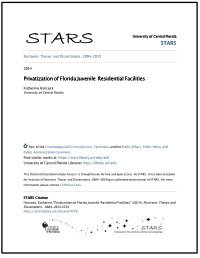Privatization of Florida Juvenile Residential Facilities
By Katherine Hancock
Privatization of juvenile facilities and services has been the norm since the inception of the juvenile justice system. However, little research has been performed examining the impact of privatization on juvenile justice, despite the possible repercussions of this policy for the juveniles served. Prior research on privatization in other fields has tended to find a connection between privatization and outcomes; however, very little research has examined how privatization impacts operations, how operations impact recidivism, and how privatization and operations interact to produce juvenile justice outcomes. This exploratory study, informed by cybernetic systems theory and principal-agent theory, examined the mechanism by which privatization influences juvenile recidivism by exploring the possible mediating effect of facility operations. Using annual juvenile facility evaluation and recidivism data collected by the Florida Department of Juvenile Justice through 548 evaluations performed on 158 facilities from 2003-2006, this research examined whether facility operations mediated the relationship between ownership (public, for-profit, and non-profit) and juvenile recidivism. Multilevel analyses were completed using Stata software to account for the clustered nature of the data (facilities nested within provider companies). The results from multilevel regression analyses indicated no relationship between ownership type and either operations or recidivism. However, multilevel regression analyses indicated significant inverse relationships between recidivism and each of four of the operational variables: program management, health care services, security, and intervention management. A mediating relationship was not supported. Results also indicated that both provider company and characteristics of the juveniles served were significant predictors of both operational variables and recidivism. These results suggest that privatization concerns may be more suitably focused on identifying the appropriate provider company rather than on choosing the appropriate ownership type. In addition, during the contract negotiation stage, juvenile justice administrators may wish to incorporate policies and/or incentives into the contract that are related to juvenile characteristics. Recommendations for future research are also discussed.
Orlando, FL: University of Central Florida, 2014. 305p.


